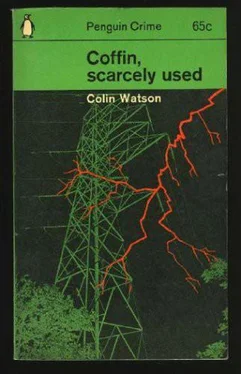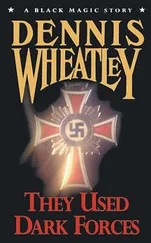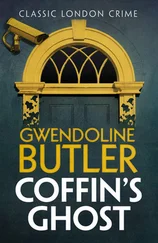“Oh,” said Purbright, “cancel mine and let the original ones go in. So much the better, sir. And thanks for letting me know. While we’re on the subject, I’d be obliged if you would make certain of being given all the replies yourself as they come in. Don’t allow them out of your hands, sir. I think that may be important. You what?...Yes, telephone my office here as soon as anything arrives—the very first one—and I’ll come over.”
Love watched him replace the receiver and said: “It could be, couldn’t it, that you’re taking a risk with that chap. How do you know he won’t grab the replies and hand you some he’s concocted himself?”
“I don’t. But I can hardly impound the whole newspaper and staff it with our lads, can I? This is just one of those occasions when we have to take a chance on somebody.”
“There may be nothing in this advertisement business.”
“Quite. We shall probably know by the week-end. Incidentally, I thought the inquest went reasonably well, didn’t you?”
Love agreed that it had. Whatever Mr Chubb had done to prime Flaxborough’s irascible and senile Coroner, it had achieved remarkable results. Not only had Mr Amblesby forborne from interrupting the medical evidence of Dr Heineman with malicious cross-questioning about his origins, but he had made no attempt to introduce homilies on drink, gadgets, Edwardian levees, or the monstrous prodigality of the working class, all subjects which Mr Amblesby considered very proper to inquests.
The only dangerous moment had been when Lintz, giving evidence of identification, touched upon his having left Gwill alone at his house on the evening before the discovery of the body. The Coroner, malevolently clicking his dentures and fixing Lintz with an eye like an agate dipped in sputum, accused: “Do you mean to tell me you left an old gentleman of his age on his own and with no one to look after him?” Lintz sullenly retorted that his uncle had been perfectly capable, by no means elderly, and strongly opposed to being looked after by anybody. “But he must be over ninety,” persisted Mr Amblesby. “He was on the association committee with me when Sir Philip trounced that radical chap...Malley, what was the fellow’s name? Pro-Boer, he was...” The sergeant had thereupon nursed him back into the present with an explanation that Marcus Gwill’s father was not the gentleman with whom they were now concerned. The rest of the proceedings had gone smoothly enough, with Mr Amblesby harmlessly slumped in a reminiscent coma.
After lunch, Purbright took himself off through the fog that was spreading inland from the already obscured harbour district and sought the offices of Possett, Gloss and Weatherby.
Mr Gloss, who privately regarded inspectors of police much as the managing director of a public transport company might regard inspectors of tickets, was careful nevertheless to give his welcome that air of unpatronizing amiability that so effectively discourages subordinates from putting demands or awkward questions. He waved Purbright to a chair, then took a seat—a smaller, harder one than his visitor’s—beside, but not at, his desk. He offered him a cigarette, a Woodbine, lit it for him with a match and said melifluously and invitingly: “Now, Inspector.”
“Now, sir,” responded Purbright, with a smile of such friendliness that if he had said outright that here was a game two could play Gloss could not have taken his meaning more clearly. “You’ll have some idea of what I’m after, I expect?”
Gloss also smiled. “Your intention, doubtless, is to grill me, inspector,” he said good-humouredly. “That is, assuming that you are investigating the lamentable death of my client, Mr Gwill.”
“You were his legal adviser, I understand, sir?”
“I was, indeed. And am still, so far as the posthumous disposition of his affairs is concerned.”
“He made a will, I suppose?”
“Oh, yes. A straightforward document. Everything goes to his nephew, Mr Lintz, including the controlling interest in the Flaxborough Citizen Printing and Publishing Company. I believe the arrangement was fairly widely understood, so there can be no harm in my revealing the terms of the will. The fact is that Mr Gwill had no one else to whom he could leave his possessions: no one of blood relationship, that is.”
Gloss looked at Purbright intently, as if daring him to cross-examine. But the will seemed to have lost significance already. The inspector went straight on to other matters.
“How long had you known Mr Gwill, sir?”
“A fair number of years, I should say. Almost a life-time, in fact. The professional relationship dates back to, oh, the early ’thirties.”
“You had always been on good terms with him?”
“Come, inspector; you do not, surely, expect me to make any such claim?” Gloss was the bluff and open advocate now. “We had differences of opinion on many occasions. Marcus was not of an altogether amenable disposition. One made allowances...” he shrugged. “One got on, notwithstanding. I wonder your inquiries, even at their present presumably undeveloped stage, have not adduced evidence of a certain coolness in my client’s attitude to others.
“But”—Gloss bulged his eyes—“do not misunderstand me. At no time, no time, was there any serious likelihood of a breach between us. Men of business never allow temporary emotional discord to blind them to the mutual advantages of association. Please do not regard that as cynical, inspector; it is plain truth.”
“It sounds logical, sir. May I ask if you had any business interest in common with Mr Gwill beyond the...the normal client-solicitor relationship?”
“Pray amplify that question, inspector. I am not altogether with you.”
“Perhaps I had better put it another way. Are you aware of any occupation, any source of income, of Mr Gwill’s, apart from his ownership of the newspaper?”
“Ah, now you are framing the question very differently. In its original form, it almost implied suspicion that Gwill and I might have shared in some pecuniary enterprise on the side, as it were. I do hope you entertain no thought of the possibility of anything so improper?”
“I’m sure you would be guilty of nothing the Law Society might frown on, Mr Gloss.”
“No, indeed. That would be quite unrealistic. As to your amended question, now...” Gloss puckered his brow and was silent a while. Then he shook his head. “The answer must be no, inspector. Not that the bare negative is incapable of qualification, you understand; but I think it will serve in the context of police investigation.”
“If I were of an uncharitable disposition,” Purbright said quietly, “I might almost take that to be a roundabout way of saying that your client’s sudden departure has left some money lying around that isn’t strictly accounted for.”
Gloss looked at the policeman with undisguised admiration. “Upon my soul, but you’re a perceptive fellow, inspector. And you’re absolutely right. The trouble is, you know”—he leaned forward—“that my client suffered a disadvantage common to many gentlemen in a commercial way of occupation. They are naturally concerned to order their affairs to meet the contingencies of our times. Taxation and so forth, you understand. But such arrangements demand supervision by a live principal—a man who can sign his name—perhaps several names, alas. Manipulation is called for, inspector. Manipulation. And a corpse, God bless us, cannot manipulate.”
“I see what you mean, sir.”
The solicitor crossed one leg over the other and examined a carefully polished shoe cap. “You must not conclude, of course, that any substantial proportion of Mr Gwill’s assets is, how shall we say, frozen. His less orthodox accounts and holdings may need to remain outside the scope of the will for the time being, but they represent no part of the money that has accrued from his publishing business.”
Читать дальше












